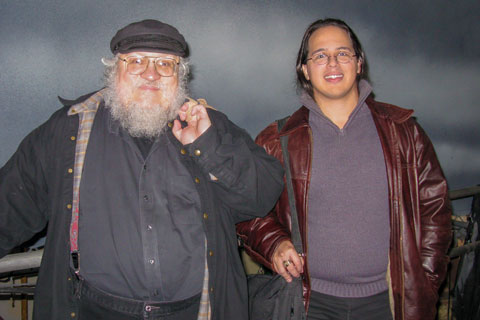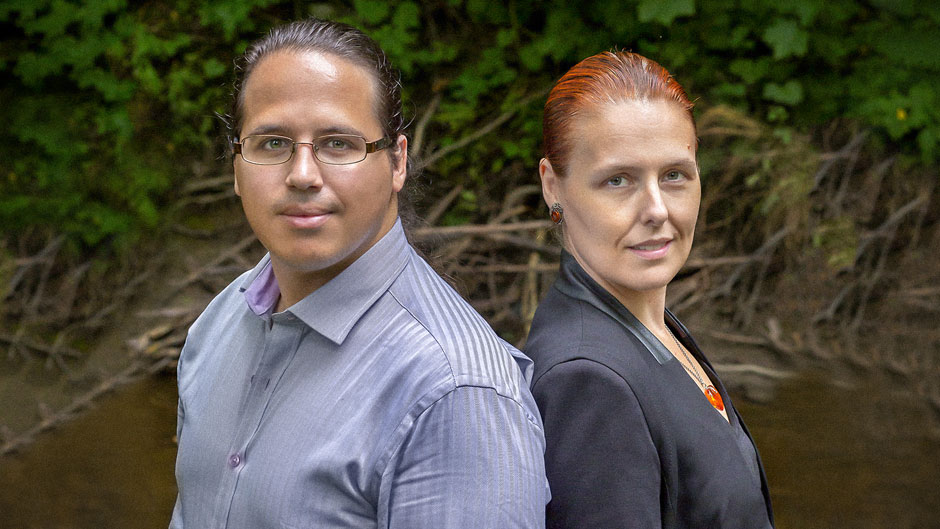After eight seasons, the HBO series “Game of Thrones” has ended, leaving fans around the world with a whirlwind of emotions.
One fan’s connection dates back to 1996 when he was at the University of Miami and years before the series had even been greenlighted by studio executives. Elio M. Garcia, Jr. – a Cuban-American student who at the time was working in the Otto G. Richter Library in the reference department – never imagined that his passion for medieval history would lead him to become one of the most trusted historians and contributors to the highly-acclaimed literary saga, “A Song of Ice and Fire” by George R.R. Martin, on which the “Game of Thrones” is based.
Now, Garcia and his wife, Linda Antonsson, are best known as the masterminds behind the world’s largest “Game of Thrones” fansite and co-authors with Martin of the book, “The World of Ice & Fire: The Untold History of Westeros and the Game of Thrones.” Garcia and Antonsson have been referred to as “the true rulers of Westeros” and even assisted the HBO show’s producers in the early “Game of Thrones” seasons with fact-checking historical details to ensure they were true to the books.
Garcia and Antonsson share some insights about their journey, the HBO series finale, and their plans for the future.
First and foremost, what are your thoughts on the series finale?
Garcia: Well, actually I stopped watching the show at the end of the fifth season. Up until the fourth season, the show producers would send George an outline of what they planned to do and ask him for his comments. But over time George became less involved in the process, and that really raised questions in my mind about whether they were capable of sticking the landing. That was part of the reason I stopped watching the show.
Antonsson: We both had issues with the show ever since they started straying from the books, but I did watch the series until the end. Once the [HBO producers] surpassed the books, we knew they had some of the endpoints to work off from George, but I feel the last two seasons, in particular, have been very rushed. There were major things happening that needed more build-up.

Now that there is a confirmed prequel series, do you know if there will be changes in the approach to making the show more accurate to the books? What do you think the prequel is about?
Antonsson: We know that they started with five pitches, and now they are down to three that are still being worked on, according to George. The pilot is already in pre-production, and whether it turns into a series is up to HBO and how they feel about it. We would definitely watch those and continue to review them on our website. There will be more room for HBO to create their own story; a defining feature would be whether it feels like Westeros or not.
Garcia: There’s also been a lot of speculation since HBO’s merging with AT&T, that they need this content to keep subscribers. There could be one series for the summer and another one for the winter, but it’s all a big question. As Casey Bloys, HBO programming chief, said in a recent interview, they would be crazy not to try to do something more in this amazing universe. We would be very happy to contribute and help [with] anything connected to George’s world and his vision. George has talked about a pilot called “The Long Night,” which is set 5,000 years in the past and focuses on the rise of the White Walkers and the Night King. None of it, from our understanding, would feature [living] characters from the current TV show.
Elio, the road from sunny South Florida to Winterfell is long. How did your journey begin?
Garcia: It all started when I discovered books by J.R.R. Tolkien in high school. I started playing a Tolkien based role-playing game online, where I met Linda. That's where she convinced me to read these books by George.
At that time I was a double major at the University of Miami studying English literature and medieval history. I was enrolled in courses that dovetailed my involvement in “A Song of Ice and Fire” fandom and my work on “The World of Ice and Fire.” I remember that Dr. David Graf’s course on Alexander the Great was a remarkable introduction into historiography: the transmission of knowledge through varying ancient sources with different biases and different gaps.
During my junior year, I took a sabbatical and moved to Sweden to be with Linda. We ended up getting in touch with George, and he asked us to make a game based on his books. From there, we kept on talking and collaborating, and now here we are.
When did George ask you to be a historian?
Garcia: It all happened the first time I met him in person. I was able to get in touch with George during my first visit to the U.S. after moving to Sweden. When he found out I was in the area, he dropped his plans and invited me over to dinner. While I was there, he gave me a tour of his house and that’s where I saw a manuscript he was about to send out to the publisher. That’s the same dinner where he asked me if Linda and I would be would be interested co-authoring a guide book with him. He likes to say we know more about Westeros than he does. He entrusted us because he saw our connection with the fandom, which was life changing for us.
Do you have any insight on the completion of the novels? Do you know if George is currently working on them?
Garcia: He’s absolutely working on them. Just yesterday, he mentioned he’s back at his office working away. The series finale has probably relieved a lot of pressure. Now he can just focus on the books and forget about the TV shows. All we know is that the books will be published 3 months after he’s finished, but I won’t go on to say anything further than that.
Antonsson: Having that dragon breathing fire down his neck was stressing him and interfering with the process. He’s now working from the mountains in an isolated cabin and that’s been working well for him. There is hope for something sooner rather than later.
“Winter is coming” is a phrase used in “Game of Thrones” since season 1. The series is about two things: “winter is coming,” and who will be the heir to the throne. In George’s mind, which one is more important to the story, or do they go hand in hand?
Garcia: Everything we do in our lives has a political dimension to it, but the idea is that when there is a catastrophe looming, people need to learn how to put aside tensions and drama to deal with the bigger picture. So yes, I think “Winter is Coming” is a theme that is more central to the overall story.
Antonsson: “Winter” is what decides the fate of humanity. Rulers can come and go, but there’s something bigger out there that would actually be able to destroy the world if it goes unaddressed.
They say truth is stranger than fiction. Do you see any parallels between the warring in Westeros and the current state of the world?
Garcia: George is a student of history, so this is an age-old story of warring, values, and conflicts between belief systems. He’s just writing based on what he apprehends as a normal course of history where there will always be conflicts.
What’s next for you?
Antonsson: We certainly plan to continue working on the website and reporting anything related to George. We’ll have coverage for the prequels. This is our main occupation, so we hope that when it comes time for the next book, we’ll read the manuscript and continue our involvement with George. We feel like there’s still a lot of opportunities left for us in Westeros.

